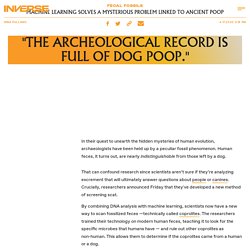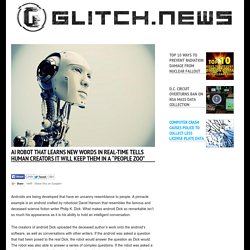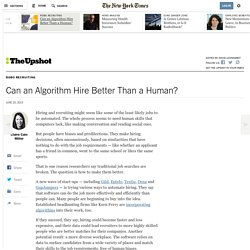

AI Generates Hypotheses Human Scientists Have Not Thought Of. Machine learning solves a mysterious problem linked to ancient poop. In their quest to unearth the hidden mysteries of human evolution, archaeologists have been held up by a peculiar fossil phenomenon.

Alexa Has Started Randomly Laughing at Users, and Amazon Is on It. The Earth is an ocean planet—more than 70 percent of the surface is covered by seawater.

But despite being such an essential part of life, the deepest parts of the world's oceans are still largely unexplored. According to the American Museum of Natural History in New York, merely 10 to 15 percent of the seafloor has been mapped with accuracy, which means we know less about the seafloor than the surface of Mars. But the state of sea exploration is changing fast. Humanoid robot takes over as teacher. Nao the robot looks like a human being and, according to the manufacturer, is now the most used teaching robot in the world.

He was developed in France and costs USD 10 000. (Picture: Aldebaran Robotics) Robots could democratize education, say optimistic researchers. Several places in the world are now experimenting with robots as teachers. Robots will be able to give all students top-notch education that is always up to date with the latest knowledge. Teaching takeover in the next decade? The coming decade could see an education revolution with robots as teachers. Humanoid robots can be programmed to know exactly what inspires students to learn. The robot instruction can always be coordinated with visual directions and pictures shown on an electronic board. Robots can also teach students one-on-one, so the instruction is neither too easy nor too difficult.
A camera and software that allow the robot to read the student's reactions ensures a good communication flow between human and machine. Cognitive assessment in the palm of your hand. AI robot that learns new words in real-time tells human creators it will keep them in a “people zoo” Androids are being developed that have an uncanny resemblance to people.

A pinnacle example is an android crafted by roboticist David Hanson that resembles the famous and deceased science fiction writer Philip K. Dick. What makes android Dick so remarkable isn’t so much his appearance as it is his ability to hold an intelligent conversation. The creators of android Dick uploaded the deceased author’s work onto the android’s software, as well as conversations with other writers. Eliza, Computer Therapist. Let's talk about your feelings.

The original ELIZA first appeared in the 60's. She seems almost human. This example of artificial intelligence works best, however, if you limit your conversation to talking about yourself and your feelings. Full sentences will give better results. Soon, Your Sex Doll Will Have An Intelligent Conversation With You. Stop trying to get Siri to talk dirty and get ready for sex dolls with an artificially naughty mind.

In 2013, we reported that robot handjobs would be our future. Your computer might know you even better than your friends do. New research has found that computers can "judge" personality traits far more precisely than previously thought.

The study found that it is possible for computers to draw inferences about a person as accurately as their spouse can. Even then, the judgements were based only on Facebook "likes. " Jointly run between Stanford University and the University of Cambridge, the study sought to find out how a computer's answers to questions about an individual would compare to those of their friends and family. A total of 86,220 volunteers provided answers to questions about themselves regarding the five basic personality dimensions of openness, conscientiousness, extraversion, agreeableness and neuroticism. A standard, 100-item long personality questionnaire was used to gather the data. Friends and family of each volunteer were then asked to provide their judgement of the individual's personality based on their existing knowledge of the person, via a 10-item questionnaire.
Share. The Enormous Implications Of Facebook Indexing 1 Trillion Of Our Posts. A whole wing of the Internet just got added to our collective conscience, like websites by Google or knowledge by Wikipedia before it.

Yet the news cruised by with analysis focused simply on what Facebook’s new keyword post search does today. Yes, any post by you or any of your friends can now be dug up with a quick search from mobile. But I don’t think people realize how big a deal it is for tomorrow. Facebook just went from data rich to Scrooge-McDuck-swimming-in-a-tower-full-of data rich. The ramifications for advertising, developers, and Facebook itself are tough to fathom. First, the trillion post index gives us group memory.Each person can only search stories from their friends and surrounding network, but Mark Zuckerberg recently said those all add up to over 1 trillion posts.
If your friends put their lives on Facebook, you can now remember them too. But this is not the Facebook Timeline. Facial-Recognition Tech Can Read Your Emotions. If someone is described as "smiling, but not with their eyes," that person is likely faking the smile.

But what does that mean, exactly? And how can one tell a real grin from a fake one? New software by California-based company Emotient can do just that. Using a simple digital camera, Emotient's software can analyze a human face and determine whether that person is feeling joy, sadness, surprise, anger, fear, disgust, contempt or any combination of those seven emotions. Can an Algorithm Hire Better Than a Human? Hiring and recruiting might seem like some of the least likely jobs to be automated.
